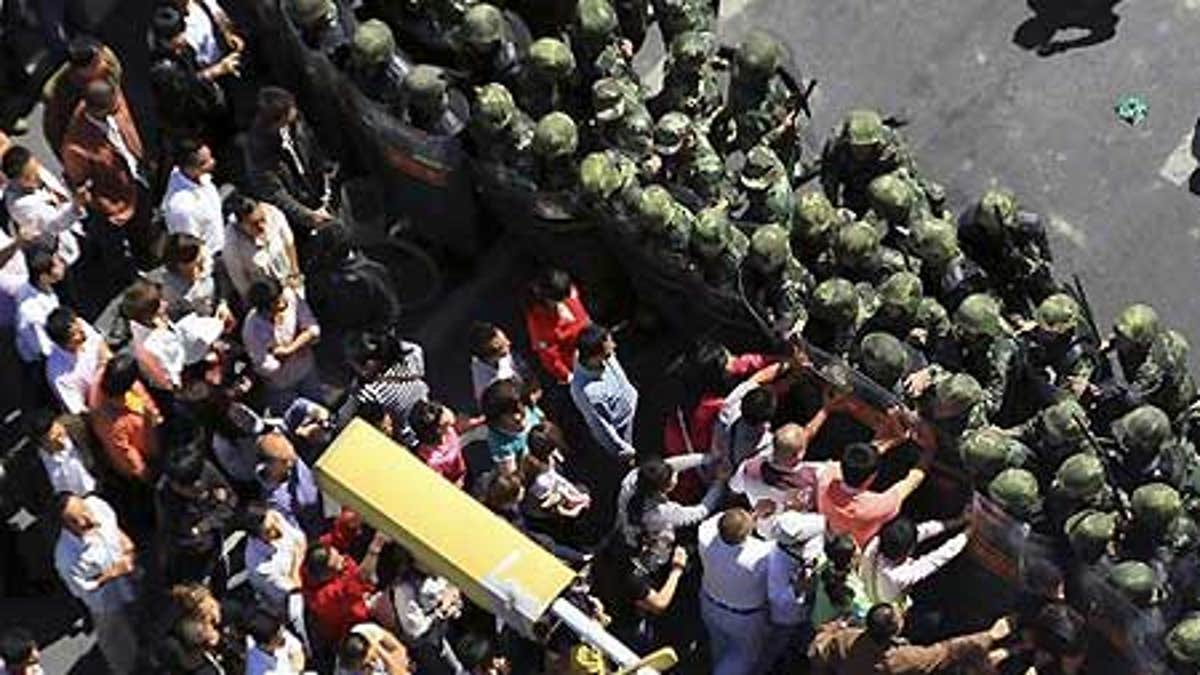
Sept. 3: Chinese protesters push against a line of paramilitary police on the streets of Urumqi in western China's Xinjiang province. (AP)
BEIJING – China's police chief accused ethnic Muslim separatists of staging a bizarre series of hypodermic needle stabbings that sent thousands of Chinese into the streets in angry protests for a second day Friday to demand increased security in this western city.
Police used tear gas and public appeals to break up crowds of Chinese marching on government offices and calling on authorities to punish people awaiting trial for communal violence that left 197 people dead in early July in Urumqi. The police response was more forceful than on Thursday, the first day of protests by members of the Han Chinese majority unnerved by the recent spate of syringe stabbings on dozens of people.
Public Security Minister Meng Jianzhu, who arrived in Urumqi to direct the police action, said the same ethnic separatists Beijing says were behind the rioting that started July 5 also orchestrated the needle attacks.
"The needle stabbing incident is a continuation of the '7-5' incident, and it's plotted by unlawful elements and instigated by ethnic separatist forces," Meng said in comments broadcast on nationwide television. "Their purpose is to damage ethnic unity."
Meng provided no evidence to back up his charges, nor has the government substantiated accusations that separatists incited July's violence. By most accounts, the riot started after police confronted protesters from the Muslim Uighur ethnic group, who then attacked Han Chinese.
But the Xinjiang region, where Urumqi is located, has for decades faced a simmering separatist movement by Uighurs, a largely Muslim ethnic group.
Meng's comments were the first time authorities suggested Uighur militants were involved in the stabbings that had fed rumors and fear in the city for days but that were first publicly reported Wednesday.
Meng's dispatch to Urumqi was a measure of Chinese leaders' anxieties that order was slipping in the often tense city of 2.5 million and that violence between Hans and Uighurs could flare anew.
Heavily Uighur neighborhoods were sealed off by security forces forming barriers at street entrances.
The official Xinhua News Agency said Meng was tasked with "defusing the ongoing unrest in the city." China Central Television showed him visiting police, troops and local residents.
In a nod to public anger, Meng vowed the government would speed up the process of charging and prosecuting the more than 1,200 people detained in the July riot.
"We should quicken the pace of dealing with the detained suspects and dig up the plotters behind this, and severely punish the murderers," Meng said.
Local police authorities said Friday that hospitals in Urumqi are now treating 531 people who believed they were attacked by hypodermic needle, 55 more than previously reported, Xinhua said. About 106 of them showed obvious signs of needle attacks, it said. Most of the victims were Han Chinese.
So far, none of those stabbed showed any signs of infection or poisonings, state media has said. Infection by AIDS is a concern, given Xinjiang's high rate of HIV cases, spread by needle-sharing among drug users.
None of 160 or so people treated at the Urumqi Medical College Hospital showed symptoms of AIDS or hepatitis, said Lin Fangmu, director of the preventative medicine department.
The most common symptom they displayed was "mainly just fear, terror," Lin said.
Undeterred by an overnight curfew and police cordons in the center of the city following Thursday's demonstration, hundreds of young Han Chinese men protested outside the headquarters of Xinjiang party secretary Wang Lequan — an ally of President Hu Jintao— chanting for him to step down.
Armed police in riot gear marched into the crowd to push people back. After several surges, the police broke up the demonstrators, some of whom were singing the national anthem.
The smell of tear gas drifted over parts of the city, and CCTV showed footage of tear gas drifting through big crowds.
Hong Kong Cable TV reported that paramilitary police had fired tear gas to disperse a crowd of about 1,000 near the city government offices Friday morning.
One Han man, who brought his 9-year-old daughter because her school was closed, argued with paramilitary police.
"It's been two months already. How many more months are we going to wait, how long before us Han can feel safe?" said the man, who would give only his surname, Ma.
A truck with loudspeakers circled behind him, with a recorded voice saying repeatedly: "Disperse. Don't stay here. Think of the nation."
Another Hong Kong broadcaster RTHK also said about 5,000 Han Chinese carrying national flags protested peacefully on Renmin Road, demanding that Wang step down. The report said paramilitary police fired several tear gas rounds to disperse them.
One middle-aged Han Chinese man said police should leave the protesters alone.
"They should be catching the terrorists, not harassing the people," said Ji Xiaolong. "I have to wonder if Hu Jintao really knows what is going on here."
Two Hong Kong broadcasters, TVB and now TV, said three of their reporters, who were detained for over three hours for filming a protest, have now been released. Some of their cameras and tapes seized earlier were also returned to them. An Associated Press photographer and TV crew also had their cameras confiscated and returned after five hours.
Calls to the press office of the Xinjiang government were not answered Friday. Chen Li, a staffer at the media center at the Haide Hotel in Urumqi, said there had not been any gatherings or clashes near the Xinjiang government or Xinjiang Communist Party offices.
The unrest shows how unsettled Urumqi remains despite continued high security since the July rioting, the worst communal violence to hit Xinjiang in more than a decade. That rioting began when a protest by Muslim Uighurs spiraled out of control, and Uighurs attacked Han. Days later, Han vigilantes tore through Uighur neighborhoods to retaliate.
